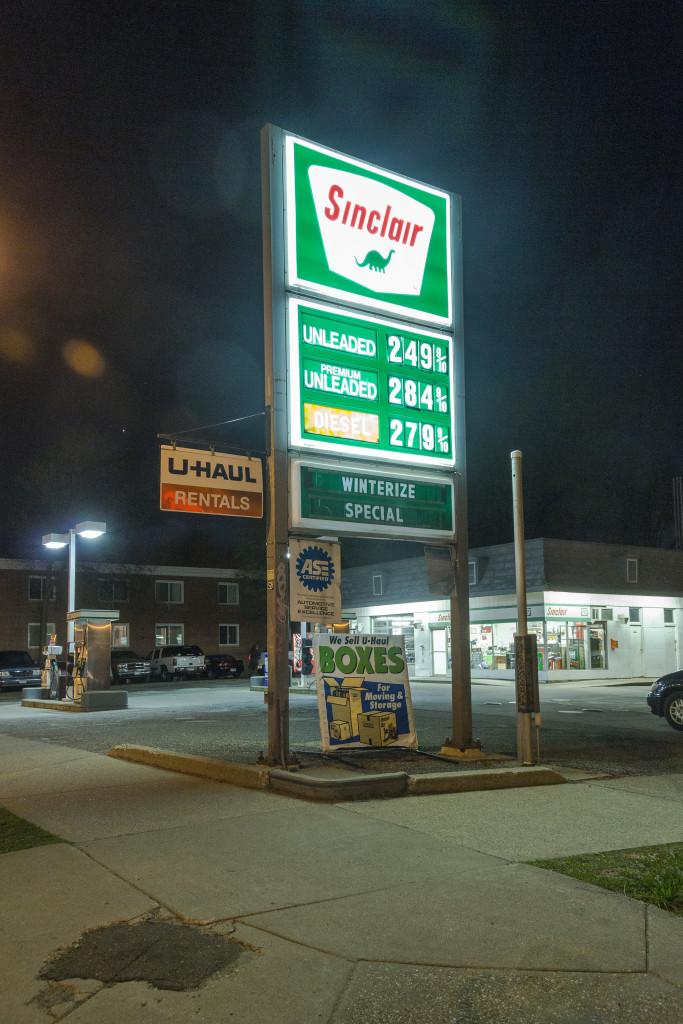
If you haven’t heard, oil is super cheap right now. US Energy Information Administration (EIA) statistics show that this week, the national average price for a gallon of gasoline is hovering around $1.80. For comparison, oil prices haven’t dipped this low since the beginning of 2009, and last year’s average was slightly above $2. These low prices aren’t just a momentary blip in a larger trend: gasoline prices began dropping last summer and the EIA projects they will continue to drop through February. Why are prices so low, and how does this impact overall greenhouse gas emissions from using oil? Do low gas prices speed up or slow down climate change?
As any economist will tell you, price is a function of quantity demanded and quantity supplied. Oil prices are low due to changes in both global consumption (demand) and global production (supply).
First, there has been some reduction in the global demand for oil because of a slowdown in the Chinese economy. When a country that usually consumes a lot of oil starts buying less, the price drops. Second, the market has been flooded with large amounts of oil. When lots of different producers are trying to sell more than they usually do, the price drops. Typically, the Organization of Petroleum Exporting Countries (OPEC) regulates the amount of oil for sale globally to try to keep prices high. However, recently they have been allowing prices to drop. Some international observers believe OPEC members are letting this happen in an attempt to drive the US and other non-OPEC member oil producers out of the market. This works by dropping the price of oil below the cost of production to force producers to take losses.
So, what does this have to do with climate change? Oil prices impact gasoline sales and use, and gasoline consumption releases carbon dioxide, contributing to climate change. According to the Union of Concerned Scientists, emissions from cars and trucks are actually responsible for 20% of US total emissions.
On one hand, low oil prices seem problematic for the environment. Low prices encourage consumers to buy and use more gasoline, producing more exhaust and greenhouse gases. On the other hand, low prices hurt producers and have caused several of the world’s largest oil companies to slow down production and even to stop drilling new wells. Could it be that low prices are keeping more oil in the ground and are therefore slowing climate change?
Well, not really. “Low oil prices are only good for the environment in so much that they make renewables look like a more profitable investment,” economics major Jack McCarthy ’18 explained. The oil companies and traditional energy industry are big enough that a period of low prices won’t cause them to collapse. If low prices incentivized investors to put their money in renewables instead of fossil fuels, that would help combat climate change. However, because oil is so cheap, renewable energy has become relatively more expensive, so consumers aren’t buying more of it, and investors have no incentive to move their money.
The prices have also thrown normal economic rules out of balance. Professor Sarah West, who teaches Environmental Economics here at Mac, explains, “All of these prices are too low from an efficiency standpoint.”
Even before gas prices took a dive, the price was not high enough to include the social costs of production. Using gasoline has many negative social impacts besides contributing to climate change, often referred to as “externalities”: air pollution, oil dependency (which can lead to issues of economic and national security), traffic congestion and urban sprawl to name a few. In fact, some economists recommend that the government implement a carbon tax to force producers to include the social cost of oil in their operating costs and therefore raise the prices they charge.
After explaining that low prices fail to account for social costs, Professor West also pointed out that low prices have ripple effects, which hurt those who work in the oil and gas industries.
Though low prices might be good for your wallet in the short term and may be preventing producers from drilling new fossil fuel extraction wells for the time being, they are still speeding up climate change in the long run.



















Phil Terry • Sep 6, 2019 at 10:36 am
I really like your blog.. very nice colors & theme. Did you design this website yourself or did you hire someone to do it for you? Plz respond as I’m looking to create my own blog and would like to find out where u got this from. thank you